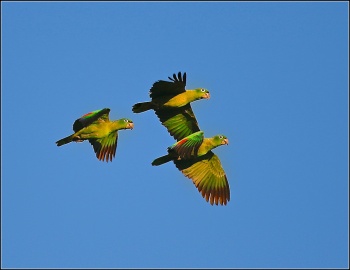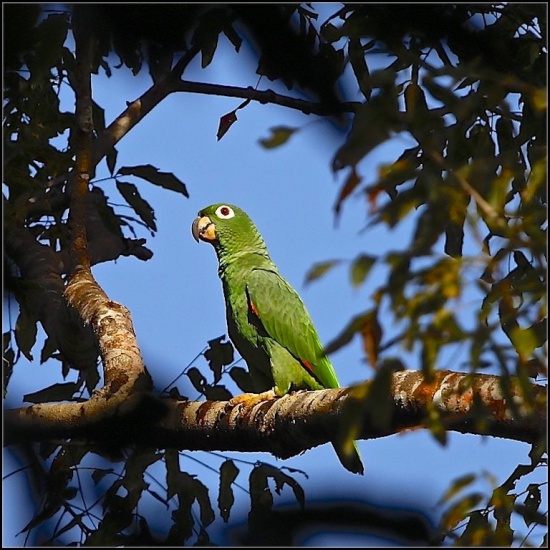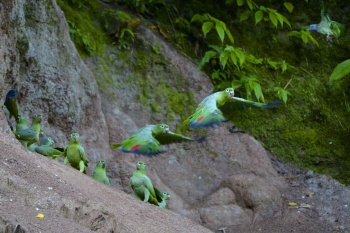m (→External Links: removed BFTV link) |
|||
| (11 intermediate revisions by 3 users not shown) | |||
| Line 1: | Line 1: | ||
| − | {{ | + | [[Image:Mealy Parrot amazona farinosa .jpg|thumb|550px|right|Subspecies ''farinosa''<br />Photo © by {{user|Stanley+Jones|Stanley Jones}}<br />Camp Darién, Darién Province, [[Panama]], February 2018]] |
| + | '''Alternative name: Mealy Amazon''' | ||
| + | |||
;[[: Category:Amazona|Amazona]] farinosa | ;[[: Category:Amazona|Amazona]] farinosa | ||
| − | + | '''Includes: Northern Mealy Amazon, Southern Mealy Amazon''' | |
==Identification== | ==Identification== | ||
| − | 38- | + | 38-43 cm (15-17 in) |
| − | + | *Green plumage | |
| + | *Paler face and underparts | ||
| + | *Back and nape have a whitish tinge | ||
| + | *Red speculum | ||
| + | *Brownish-maroon to amber eyes | ||
| + | *Broad white eye-ring | ||
| + | ====Subspecies Variation==== | ||
| + | [[Image:Mealy Amazons AWP 5323.jpg|thumb|350px|right|Photo © by {{user|AWPittman|AWPittman}}<br />Amazon Rain Forest, [[Ecuador]], December 2014]] | ||
| + | To distinguish races ''virenticeps'' from ''guatemalae'' away from their natural habitat look for the extension of the blue on the head. Race ''virenticeps'' has the front and sometimes the area above the eyes bluish. Sometimes mixed with some very small yellow or even red feathers. From the back of the head down the nape there is a dark-grey patch of feathers (nominate ''farinosa'' has a dark black scalloping). Depending on the lightfall it might sometimes show a purple haze. Extension varies between individuals. Race ''guatemalae'' has the blue all over the crown to the back of the head and no dark grey towards the nape. The blue may vary from a soft-powder blue to rather dark blue.<br /> | ||
| + | Bill colour is variable in both subspecies: Completely grey, greyish or horn-coloured with a blackish tip or even complete shiny black. | ||
==Distribution== | ==Distribution== | ||
| − | [[Central America]] and [[South America]]. | + | [[Image:Mealey Parrots.jpg|thumb|350px|right|Subspecies ''farinosa''<br />Photo © by {{user|Stanley+Jones|Stanley Jones}}<br />Chuncho Macaw Clay Lick, Puerto Maldonado, Reserva Nacional Tambopata, Madre de Dios Department, [[Peru]], August 2018]] |
| + | [[Central America|Central]] and [[South America]]<br /> | ||
| + | '''Central America''': [[Mexico]], [[Guatemala]], [[Belize]], [[Honduras]], [[Nicaragua]], [[Costa Rica]] and [[Panama]]<br /> | ||
| + | '''South America''': [[Colombia]], [[Venezuela]], [[Guyana]], [[Suriname]], [[French Guiana]], [[Ecuador]], [[Peru]], [[Bolivia]] and [[Brazil]]. | ||
==Taxonomy== | ==Taxonomy== | ||
| + | ====Subspecies==== | ||
| + | There are 3 subspecies<sup>[[#References|[1]]]</sup>: | ||
| + | *''A. f. guatemalae'': | ||
| + | :*Caribbean slope of south-eastern [[Mexico]] to north-western [[Honduras]] | ||
| + | *''A. f. virenticeps'': | ||
| + | :*[[Honduras]] (Sula Valley) to extreme western [[Panama]] | ||
| + | *''A. f. farinosa'': | ||
| + | :*Eastern [[Panama]] to [[Colombia]], the [[Guianas]], north-eastern [[Bolivia]] and eastern [[Brazil]] | ||
| + | |||
| + | Two additional subspecies ''inornata'' and ''chapmani'' are generally considered invalid<sup>[[#References|[1]]]</sup>. | ||
| + | |||
| + | It has been proposed to separate the two first subspecies into Blue-crowned Parrot (Amazon). However Gill and Donsker have split this species, ''farinosa'' as Southern Mealy Amazon and ''guatemalae'' and ''virenticeps'' as Northern Mealy Amazon. | ||
==Habitat== | ==Habitat== | ||
| − | Humid to semi-humid forest and plantations. | + | Humid to semi-humid lowland forest and plantations. |
==Behaviour== | ==Behaviour== | ||
| − | 3 eggs are | + | ====Breeding==== |
| − | + | They nest in a tree hole. The 3 eggs are incubated by the female for 28 days. The male feeds both the female (whilst she is incubating) and later the chicks, with regurgitated food. | |
| + | ====Diet==== | ||
The diet includes fruits, seeds, berries, nuts, blossoms, and leaf buds. | The diet includes fruits, seeds, berries, nuts, blossoms, and leaf buds. | ||
| + | ==References== | ||
| + | #{{Ref-Clements6thAug18}}#{{Ref-GillDonsker14V5.2}}#Avibase | ||
| + | #BF Member observations | ||
| + | #Handbook of the Birds of the World Alive (retrieved January 2016) | ||
| + | #Wikipedia | ||
| + | #[http://www.birdforum.net/showthread.php?p=2961466 Birdforum thread] which discussed this possible split of Mealy Parrot in posts starting with number 148 | ||
| + | {{ref}} | ||
==External Links== | ==External Links== | ||
| − | {{GSearch|Amazona | + | {{GSearch|"Amazona farinosa" {{!}} "Mealy Parrot" {{!}} "Mealy Amazon"}} |
| + | {{GS-checked}}1 | ||
| + | <br /> | ||
| + | <br /> | ||
| + | |||
[[Category:Birds]] [[Category:Amazona]] | [[Category:Birds]] [[Category:Amazona]] | ||
Latest revision as of 18:55, 31 May 2023
Alternative name: Mealy Amazon
- Amazona farinosa
Includes: Northern Mealy Amazon, Southern Mealy Amazon
Identification
38-43 cm (15-17 in)
- Green plumage
- Paler face and underparts
- Back and nape have a whitish tinge
- Red speculum
- Brownish-maroon to amber eyes
- Broad white eye-ring
Subspecies Variation
To distinguish races virenticeps from guatemalae away from their natural habitat look for the extension of the blue on the head. Race virenticeps has the front and sometimes the area above the eyes bluish. Sometimes mixed with some very small yellow or even red feathers. From the back of the head down the nape there is a dark-grey patch of feathers (nominate farinosa has a dark black scalloping). Depending on the lightfall it might sometimes show a purple haze. Extension varies between individuals. Race guatemalae has the blue all over the crown to the back of the head and no dark grey towards the nape. The blue may vary from a soft-powder blue to rather dark blue.
Bill colour is variable in both subspecies: Completely grey, greyish or horn-coloured with a blackish tip or even complete shiny black.
Distribution

Photo © by Stanley Jones
Chuncho Macaw Clay Lick, Puerto Maldonado, Reserva Nacional Tambopata, Madre de Dios Department, Peru, August 2018
Central and South America
Central America: Mexico, Guatemala, Belize, Honduras, Nicaragua, Costa Rica and Panama
South America: Colombia, Venezuela, Guyana, Suriname, French Guiana, Ecuador, Peru, Bolivia and Brazil.
Taxonomy
Subspecies
There are 3 subspecies[1]:
- A. f. guatemalae:
- A. f. virenticeps:
- A. f. farinosa:
Two additional subspecies inornata and chapmani are generally considered invalid[1].
It has been proposed to separate the two first subspecies into Blue-crowned Parrot (Amazon). However Gill and Donsker have split this species, farinosa as Southern Mealy Amazon and guatemalae and virenticeps as Northern Mealy Amazon.
Habitat
Humid to semi-humid lowland forest and plantations.
Behaviour
Breeding
They nest in a tree hole. The 3 eggs are incubated by the female for 28 days. The male feeds both the female (whilst she is incubating) and later the chicks, with regurgitated food.
Diet
The diet includes fruits, seeds, berries, nuts, blossoms, and leaf buds.
References
- Clements, J. F., T. S. Schulenberg, M. J. Iliff, D. Roberson, T. A. Fredericks, B. L. Sullivan, and C. L. Wood. 2018. The eBird/Clements checklist of birds of the world: v2018. Downloaded from http://www.birds.cornell.edu/clementschecklist/download/
- Gill, F and D Donsker (Eds). 2015. IOC World Bird Names (version 5.2). Available at http://www.worldbirdnames.org/.
- Avibase
- BF Member observations
- Handbook of the Birds of the World Alive (retrieved January 2016)
- Wikipedia
- Birdforum thread which discussed this possible split of Mealy Parrot in posts starting with number 148
Recommended Citation
- BirdForum Opus contributors. (2024) Mealy Parrot. In: BirdForum, the forum for wild birds and birding. Retrieved 10 May 2024 from https://www.birdforum.net/opus/Mealy_Parrot
External Links
GSearch checked for 2020 platform.1





